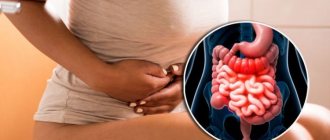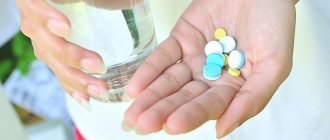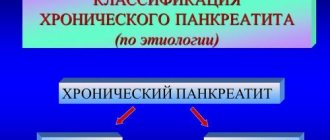Seething in the intestines is the result of a normal digestive process or evidence of disturbances in the gastrointestinal tract. In both cases, it causes a person some aesthetic discomfort if the sounds coming from the abdomen are quite loud and prolonged.
Let's talk in more detail about in what cases the phenomenon in question is not considered a disease and what needs to be done if rumbling is the result of pathology.
Deviation or norm
Grumbling from the intestines can be either a sign of improper functioning of the gastric tract or a natural physiological process. You can understand whether there is a need to seek medical help by the time, nature, location and frequency of sounds.
Constant rumbling
An examination carried out on the basis of a patient’s complaint that the intestines are constantly rumbling often reveals the presence of dysbiosis
– a malfunction in the ratio of beneficial and pathogenic bacteria living on the mucous membranes of the gastrointestinal tract. Food processing is disrupted. Gases formed during its decay accumulate in the intestinal lumen. This explains the appearance of sounds.
The second common cause of rumbling is constipation and accumulation of stool in places not intended for this (the folds of the colon). Insufficient evacuation of intestinal contents leads to increased gas formation, nausea, bloating, belching and the appearance of extraneous sounds. The symptom persists until the gastrointestinal tract is cleared of waste products.
As it became clear from the above, the stomach can constantly gurgle and rumble due to the accumulation of gases in the digestive organs. In addition to dysbiosis and constipation, this phenomenon develops with the following disorders:
- Oncology, polyps, adhesions (partial obstruction of the lumen by a tumor).
- Parasitic diseases (helminths disrupt the digestion process, the product rots, gas is released).
- Inflammation (enteritis, gastritis).
- Intestinal strictures (partial obstruction and associated incomplete removal of feces).
- Diseases of the upper gastrointestinal tract (lack of teeth causes insufficient chewing of food, the formation of a too dense lump).
The conditions described in the text lead to constant rumbling. It is observed in patients every day, often after a few minutes after eating. In this case, the patient may swell. Occasional sounds do not indicate the presence of illness.
Rumbling after eating
Grumbling is considered normal if it began some time after consuming a particular food product. This phenomenon is caused by the ingestion of air bubbles along with food. Once in the intestines, the latter cause the appearance of extraneous sounds.
Too loud afternoon rumbling may indicate the initial stages of gastritis or peptic ulcer.
However, this symptom in itself has no diagnostic value and can only serve as an indication for examination. The disease is detected using endoscopic methods.
Video: Rumbling in the stomach (boiling) after eating
At night
At night, rumbling in the intestines can occur for the following reasons:
- Eating shortly before bedtime.
- Hunger.
- The presence of all the conditions described in the section on constant rumbling.
- Failure of the process of removing gases when the patient is in a supine position.
Prevention
Find out more
Once you have dealt with the symptoms, you should think about prevention. It will be appropriate to adjust your lifestyle to reduce the burden on your digestion. Meals can be divided up to 4-6 per day and develop the habit of eating at the same time, balancing the diet according to the ratio of proteins, fats and carbohydrates. The last dose should be no later than 3 hours before bedtime. Moderate physical activity and stress management can also have a beneficial effect on the functioning of the pancreas2.
It is difficult to avoid or predict errors in nutrition, but you can have on hand a faithful digestion aid - the drug Creon® 10000. You can read more about the drug here.
Diagnosis of diseases
The following methods for detecting intestinal pathology are used in medical institutions:
- Laboratory tests (general analysis of urine, blood, biochemistry, coprogram).
- Hardware (ultrasound, virtual colonoscopy).
- Instrumental (gastroduodenoscopy, sigmoidoscopy).
The above invasive procedures are uncomfortable for the patient. Therefore, their implementation is indicated only in the presence of symptoms of intestinal damage. These types of studies are not prescribed for preventive purposes.
Video: How to get tested. Colonoscopy
Why does the intestines bubble after eating?
Improper and unbalanced nutrition is one of the main factors in the occurrence of flatulence.
. An unbalanced diet can cause the development of stomach diseases, therefore, when the first signs of flatulence and seething appear, it is necessary to find out their causes and eliminate them in time.
It is not recommended to drink various liquids during meals.
Food must be chewed well, as it will be better absorbed.
, and this will facilitate its digestion by the gastrointestinal tract. Also, gastric juice, which is produced during chewing, helps the synthesis of lactobacilli, which are involved in the process of absorption and breakdown of food.
It is best to drink a glass of water half an hour before meals or one hour after meals. This will facilitate the rapid removal of harmful acids and salts from the body. Fermentation of food in the body appears after eating heavy foods such as grapes, baked goods, pears, so they are also not recommended to be eaten immediately after breakfast, lunch or dinner.
Treatment methods
Depending on the identified pathology, seething therapy can be carried out using medications, traditional methods or diet. In the presence of strictures and tumors, treatment can only be surgical. Each of the methods for restoring the functioning of the stomach should be considered in more detail.
Medicines
The following medications are used to normalize digestion:
- Probiotics are substances containing live bacterial strains (Bifiform, Bifidumbacterin, Lactobacterin).
- Prebiotics – food for beneficial intestinal microorganisms (Duphalac, Lactulose).
- Synbiotics – a complex of pro- and prebiotics (Maxilac).
- Antibiotics (Amoxiclav, Levomycetin) - non-selectively destroy microorganisms living in the area of their presence. Used only for serious inflammatory processes in the intestines.
- Hemostatic agents (Etamzilat, Vikasol) are agents that accelerate blood clotting and help stop bleeding. Prescribed for damage to the capillary network caused by helminths or foreign bodies.
- Antispasmodics (Papaverine, Drotaverine) - necessary to relieve spastic phenomena and reduce intestinal tone.
The list of drugs can be expanded in accordance with the existing diagnosis. If there is an oncological process, the patient receives cytostatic drugs. Surgery for intestinal obstruction requires the addition of parenteral antibiotics, regenerative and immunostimulating drugs to the therapeutic regimen.
Diet
When rumbling is caused by physiological disruptions without disturbing the anatomical structure of the intestine, it can be eliminated solely by following a diet. Patients are advised to exclude from the diet foods that promote fermentation (yeast, legumes, cabbage, sorrel), and carbonated drinks (lemonade, mineral water, kvass). The diet should include dairy foods, low-fat cereals, slimy soups, and bran bread. Usually this is enough for the gastrointestinal tract to recover.
How can you tell if your stomach hurts due to intestinal problems?
Problems with the intestines may be indicated by non-localized pain (when the stomach hurts, but the person cannot say exactly in which place), pain in the lower abdomen and cramping pain in this area. In any case, only a doctor can accurately determine that the problem is in the intestines. With a high probability, the cause of the problems will be a functional intestinal disorder. However, it is first necessary to exclude more serious pathologies - the doctor will ask the patient in detail about the symptoms, prescribe a blood and stool test, and, if necessary, a colonoscopy. Further actions depend on the results of the study.
If all the results are negative, then the cause of the pain is most likely the same irritable bowel syndrome (IBS). Typically, treatment of the disease begins with an analysis of the symptoms. If you eliminate the factor that provokes the attack, you can avoid recurrence of the problem. For short exacerbations, medications that relieve the symptoms themselves are suitable. So, due to a spasm, a person sometimes cannot go to the toilet, and with IBS, spasms cause pain and bloating. In this case, antispasmodics are used as an ambulance.
Sometimes during treatment, your doctor may prescribe antidepressants. With irritable bowel syndrome, such drugs help cope with pain and slow down bowel function, and are good for diarrhea. Scientists have also established a connection between increased anxiety and IBS symptoms, so your doctor may recommend visiting a psychotherapist.
Possible complications
Despite the apparent innocence of the disease, loud rumbling in the stomach can lead to the development of serious complications. The table below shows options for symptom progression depending on the existing disease:
| Pathology | Possible complications |
| Dysbacteriosis | Development of inflammation, digestive disorders. |
| Helminthiasis | Lack of nutrients, chronic bleeding, anemia. |
| Constipation | Intestinal distension, fecal impaction. |
| Inflammatory processes | Impaired food processing, nonspecific symptoms of infection, dehydration, diarrhea. |
| Tumors | Metastasis, intestinal obstruction. |
| Strictures | Partial blockage of the lumen. |
Depending on the form and characteristics of the course of the underlying pathology, other types of complications may occur: intestinal perforation, sepsis, cachexia.
In the vast majority of cases, the symptom in question is a consequence of disruptions in the microflora and goes away on its own over time, without medical intervention. However, the risk that rumbling is caused by serious and dangerous diseases cannot be ignored. If you constantly have unusual sounds from the abdomen, you should consult a doctor for a diagnosis and treatment.
Disease of civilization
Modern people quite often encounter IBS. This is especially true for those who are engaged in intellectual work. Such people experience constant stress, which leads to an imbalance in the nervous regulation of internal organs. Against this background, the intestines begin to function incorrectly. Spontaneous spastic contractions are replaced by expansion of the intestinal lumen.
Other predisposing factors:
- taking antibacterial drugs;
- surgical intervention on the pelvic or abdominal organs;
- previous intestinal infections;
- genetic predisposition.
Women aged 30 to 50 years are at particular risk.
Effective drugs
Rumbling appears from poor eating habits and an unhealthy lifestyle. There are several remedies to get rid of this discomfort:
- Beneficial bacteria. First, the cause of the rumbling is identified. If there is constipation or diarrhea, flatulence, then this is probably due to dysbiosis. Probiotics help eliminate it. There are many drugs in pharmacies that include beneficial bacteria. These are “Linex”, “Hilak Forte”, “Lactobacterin”, “Bifiform”, “Acipol”.
- Enzymes. These funds are required in case of overeating and poisoning, when the pancreas temporarily does not produce the enzymes that are necessary for the absorption of food. “Mezim”, “Pancreatin”, “Festal” are used.
- Anti-flatulence medications. These are symptomatic remedies that eliminate gas bubbles in the intestines. Espumisan helps.
- Antispasmodics. If colic or acute pain occurs when rumbling, these remedies are needed. These are “No-shpa”, “Spazmol”, “Biospa”.
- Sorbents. These medications absorb toxins, waste products, alcohol breakdown products, and pathogenic bacteria during poisoning. These include activated carbon, Polysorb, Filtrum, Smecta.
In pregnant women
Often this discomfort appears during pregnancy. Is it dangerous? The reason for the noise lies in hormonal instability during fetal formation. Progesterone levels increase, which relaxes the smooth muscles inside the body, including the intestines.
From the 2nd trimester, disorders of the physiological localization of the intestine appear due to fetal growth. The organ is compressed and can be displaced by the uterus, since the child’s growth is individual. All this can affect gas formation. The process of defecation is also disrupted and peristalsis decreases.
To prevent symptoms from bothering you, you need to remove irritating products from your diet. You can determine it yourself by monitoring the intestinal reaction after eating food. Before changing your diet, you should consult your doctor. Sometimes seething does not occur for a safe reason, which can lead to dangerous pathologies.









